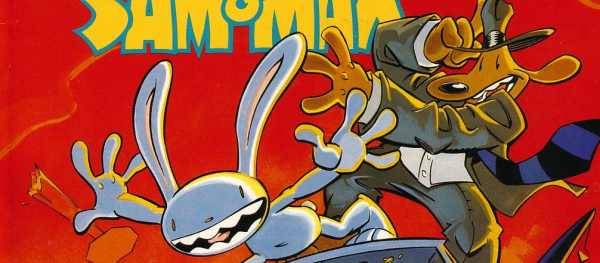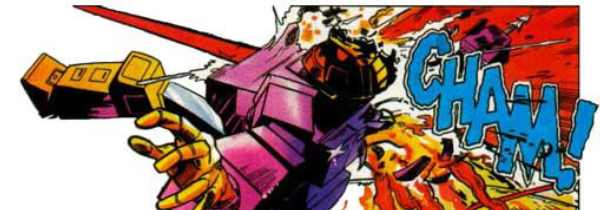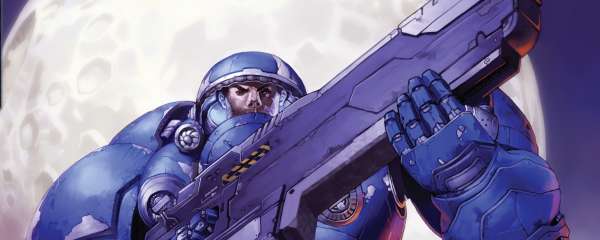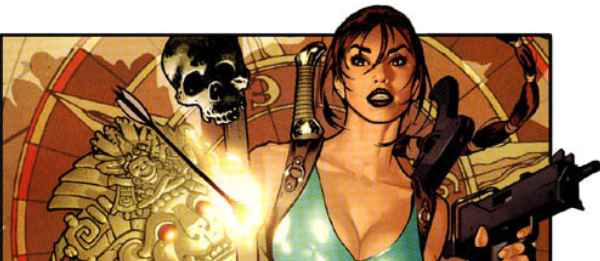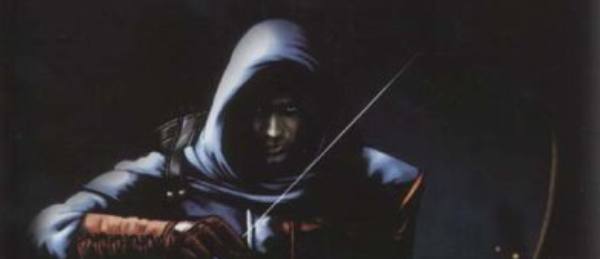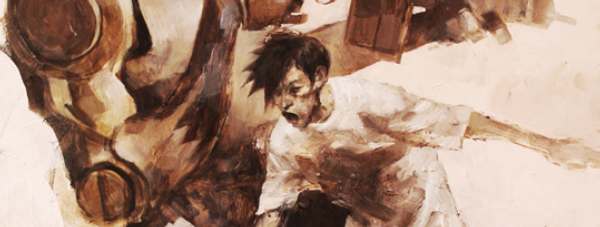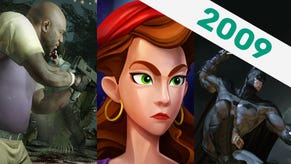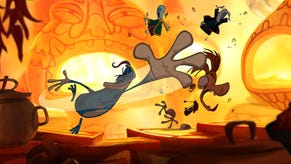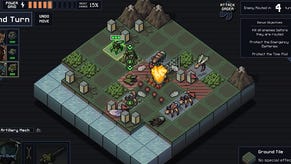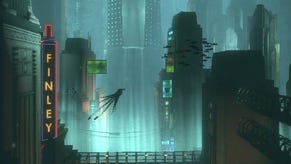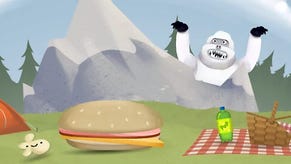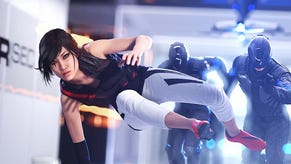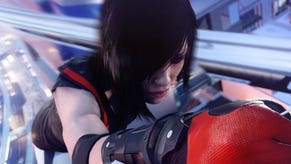Ninth Art Meets Tenth Art: Games To Comics
I found myself chatting to Rhianna Pratchett yesterday about her just released comics spin-off of Mirror's Edge. Well - the first part of six anyway (First pages here). It's been interesting for her. As she tells to CBR, it's her first work in the medium, and she had to do some serious thinking about its strengths and limitations before doing so. Which got me casually thinking a little more on the topic, but from the other way around - as in, what's the specific strengths and weaknesses of bringing a game to a comic. And while there's been a deluge of games-to-comics work in the last few years, what games would I pursue were I a comics editor interested in putting out entertaining comics. Which is, of course, a different thing from a comic that does the business.
Because that's the key thing - the Gold Standard isn't something you can make a quick buck off (though that's perfectly fine). The Gold Standard is something that can run and run and have a lot of fun in the medium and make people terribly happy. From a consumer of culture, it's easy to be dismissive about anything which crosses media - it's derivative work, and therefore intrinsically trashy. Especially when comics (or films) to games work has been traditionally questionable in quality.
But you can't dismiss it. Because if you do, the originally-a-comic Sam & Max goes out the window. Flipping it around, however, and we've yet to see something as epochal as Sam & Max was to games appear in a comics. Is it a problem with the medium? It's a common theme in comics blogosphere reviews to note that games are wholly unsuited, due to the main thrill being in the untranslatable viscerality, yaddayaddayadda. This is just the modern version of movie critics using phrases "comicbook nonsense" to demean another medium. When a perfectly fine film has been made out of a theme park ride and veteran comics readers get all misty eyes over such unpromising subject material as toy lines Rom: The Space Knight and Micronauts you've got to assume it's doable.
So what makes something work?
(And probably before going any further, I should note the self interest here. I do the comics thing when I'm not writing games. In fact, with my Starcraft story coming out in the next Tokyopop Starcraft: Frontline anthology, I've got one foot in this particular ring already. So you may read all this as just me touting for work, if you wish.)
Generally speaking, two things are required for optimum comics. Which isn't to say that entertaining work can be done without them, but for the best chances of allowing such stuff...
1) An enormous, detailed and fascinating world with key characters being secondary.
2) A strong character with or without a world of note. Perhaps even better "without".
And a third thing which will allow you to make even the least suitable for translation material sing...
3) The owners of the licence being entirely fine with you doing whatever the hell you want.
The third is kinda obvious, but worth stressing. The biggest problem with making a licensed work is the licensor. If they keep too tight strings on the material, the creatives who are doing the comic won't be able to do anything - in fact, even if either of the first two points are totally true, trying to do good work in bondage will over-rule it. You can't do good work if the licensor doesn't let you. Most will want to have some control. But if you're basically able to do whatever you want, the sky's the limit - get a creator who's willing to commit to the material, and memorable work can appear that eventually owes only a little to the original source.
(That's the Rom and Micronauts story right there. British readers may have similar feelings over early Grant Morrison in Zoids or Simon Furman's Transformer stories, where the only worry seemed to be that they had to introduce some of the new ranges upon occasion.)
I suspect that's going to happen relatively few times, as developers and publishers are far more aware the concept of maintaining their brand than they were in the eighties. Which is a shame, but also obviously understandable. There's one exception to this trend which comes to mind is where the developer does the comics themselves, or its visionary figure is directly involved. For the latter, Jordan Mechner's involvement with 1st Second's Prince of Persia game. For the former... well, if the Dreamfall sequels never emerge and Ragnar decides to follow up his suggestion on doing them in comics form may be the first ("I’ve said that if we don’t get to finish the story in games, then we’ll do it in books or a comic book. I’d love to do a comic book actually. I’ve been talking to a friend of mine about a comic taking place in the ten years between the first two games.").
(Rhianna's writing of the Mirror's Edge comic doesn't count, because while she's the writer of the game and knows the world as well as anyone, she doesn't have carte blance. It's still DICE's game.)
Moving past those issues of licensing - (and you never will) - those first two points...
The first one means that the world's capable of being explored in depth. If it's a story-driven game, you can be sure the main events will be pushed in the games. As such, you won't be able to change anything significantly in the world - which means you're left doodling in the margins. You need a lot of margins to doodle in to create something satisfactory. The more interesting the world is and the less connected it is to the main characters, the better. The problem with strong leads is that... i) the stronger they are, the more your readers will expect to see them and ii) since they're key to the property, you won't be able to do anything to alter them significantly.
To choose an example, Starcraft is almost perfect. The world's plenty big. There's a lot of world detail you can hone in on. As such, my story goes right for a faction which was barely mentioned in the main thrust of the game, playing around with a Kel-Morian salvage mission. The problem is that while big, Starcraft's still defined by the game's leads. There's a desire to see - say - Kerrigan. You can perhaps get by with a cameo, but for a longer scale work in the world, people would want to see more of these icons. And since you can't really do anything to 'em icons, you're going to eventually get relatively unsatisfying works.
The other Blizzard major world - Warcraft - is better in that regard. Yeah, there's these big hefty characters from the game, but the effect of World of Warcraft has been to democratise herosim in Azeroth. As the name may suggest, it's created a greater natural interest in the state of the World. Abstractly, even better potential subject matter for comics would be the Warhammer worlds, where scale is so enormous that even the biggest characters in other fictions would be a footnote. You can destroy whole worlds in Warhammer 40K and no-one will even blink. There's millions more where that came from. The margins for you to doodle in are the size of most other universes.
And what about option 2?
Well, this is where you do have an iconic character and that's all anyone wants to see. You literally can't do a story set in this universe without this character, as there's nothing to the place except them. These are characters in the James Bond mold. Everything else around him changes, bar the series tropes: As long as we've a guy looking brutish and British in a suit, we're happy. The world is generated anew - the character remains.
While I've never read the comics so couldn't speak for their quality, it's noteworthy that in amount of time there was an ongoing Tomb Raider comic for supports this rule. There were Tomb Raider comics for a clear five years. Why? Because Lara Croft is Indiana Jones with a posh accent and tits. You can throw her through as many action/investigation/mystery plots as you wish. The world is a constantly replenishing place of archeological strangeness.
The reason why a more defined world actually can hurt this sort of character is that you simply can't change it significantly, for reasons stated previously. So if it's characteristic and not that big a place, you're in risk of running out of stories you can tell with that one character in that one world.
Which leads me to two games to comics concepts people have asked me about upon occasion. Both are games I love, neither which I'm convinced would work and only one which I'd have a crack at if the job was offered to me.
Unless the money was really good.
Like, obv.
Okay. I'm going to say the games, and I want you to guess which one I think is just about feasible and which is a really bad idea.
THIEF and DEUS EX.
And now I'll pause while you have a little think.
Little thunked?
Well, my take is that Deus Ex is a phenomenally bad idea for a comic. It's not that it's undoable. It's just undoable in a way which stays true to the subject material - and the bits you can stay true to will actively be actively uninteresting in another medium.
Deus Ex features a defined lead character, whose main characteristic is that he's not very interesting. He's a blank slate for the player to imprint their own decisions on - being ever-so-slightly laconic is about as good as it gets. Worse, he's got a defined world with a set story arc. It starts with him as a newly created character. We end with him closing the world.
(You could get away with a retelling of the Deus Ex story in comics... but why would you?)
Not only does he close the world, but he does it in multiple ways. Choose any one to continue from, and you've alienated one third of your readership. Choose all three, and you have Invisible War, which pleased pretty much no-one. This is the larger philosophic problem - it's a game that's defined my the multiple choices of character. Without formalist experimentation and/or gimmickry (and choose your own adventure comics have been done before) you can't really capture what made Deus Ex work.
And if you don't, you're left with a character who hasn't one, a cast who isn't that interesting either and a world that's just a car crash of nineties conspiracy theories. Oh - and you can't do anything with it because it's been neatly tied off.
But Thief? Totally do-able.
It's an option 2. We have a strong character - I couldn't parse JC Denton's voice without research, but I could have a shot at Garrett's without even trying - who has a set job which leads to adventures. Garrett goes and steal stuff: hi-jinks ensue. You can spin caper stories off that pretty much indefinitely. The first problem is its initial strength. Thief's got an interesting, novel world which you'd have to keep. As argued earlier, this will eventually become a barrier when you can't change it. But that's only eventually. Without being given full access to option 3, there's a dead end - but there's a good chunk of comics to write before then. Equally, while Thief 3 closed Garrett's arc, you've still got an entire life of misadventure to draw on. There's places to put the stories in his chronology, depending on whether you want to concentrate on the master training novices after Deadly Shadows or an earlier lone wolf.
Biggest problem is entirely one of the medium, but it's what I view as an interesting technical challenge rather than an impossibility. It's a game about hiding, not direct confrontation. Can you do that in a comic? Make it solely about tension? Hmm. Dunno. It'd be interesting to find out. I suspect trying to directly mirror it would fall flat, and you'd have to play up the other aspects of the world to compensate. Human interactions and metaphorical backstabbing would work better in comics than the game. I think pushing the atmosphere thing as hard as it could would be the other possibility - I'd like to see what someone like Ashley Wood would do with the City.
That the activity works in comics is something you have to consider - and also whether the activity is all there is to the world. It's one reason why I don't envy Rhianna with Mirror's Edge. Its Le Parkour-running is about motion. In the same way that car-chases are difficult to pull off, a plain chase sequence creates problems of motion. You'd pull it off easier in a manga-digest format with many more pages than a traditional 22-page thing, using artful decompression to capture the sense of pace.
(Randomly: most game's basic interaction is a fine fodder for comics - kicks and 'splodes works in pretty much any medium)
That went on longer than I thought I would. You may guess that I annoy my editors and artists immensely with over-written e-mails. But if you're worked your way through the lot... what's your thoughts? What games would you like to see in comics? What do you think wouldn't work? Hell, for the creative sorts, what would you like to write personally?
Speak. I'm interested.


